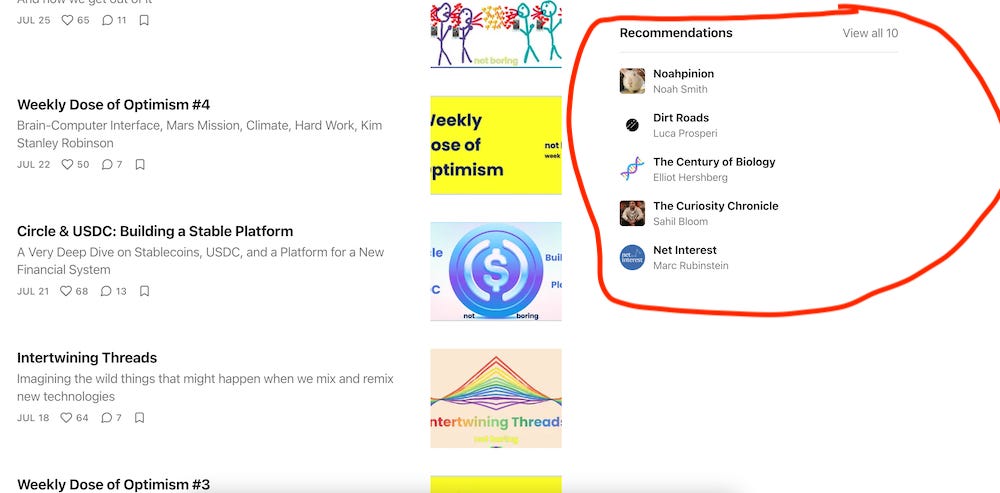These Controversial Substack Thoughts Changed My View of the Internet Forever
I guarantee they’ll do the same for you and help you share ideas online.
Everyone has to share ideas to survive, have shelter, and buy food.
So sharing ideas online is a skill we all need, whether you think of yourself as a creator/writer or not.
I’ve spent a lot of time studying and writing on Substack. Two controversial thoughts have changed my view of Substack. And they’ve transformed the future of the internet.
Only most haven’t realized it yet. Here they are.
1. Content discoverability has forever changed
In the early days of the web you’d search google to find videos, audio, and writing.
This form of discoverability isn’t as popular anymore because what gets shown is heavily manipulated by clever SEO marketers.
Later in the web’s journey social media became huge. Platforms like Twitter, Instagram, LinkedIn, and Facebook emerged.
The idea is that you scroll a central newsfeed full of content from people you know, and don’t know.
Rather than search for content, it finds you.
This worked well for a while until people began to game the newsfeed.
Normal people got together in groups and started liking/commenting on each other’s posts to boost views.
Then even smarter people started making bold promises in headlines that weren’t even true.
Then evil people realized that fear and destruction sell the best so they started posting End-of-America, the world is going to end trash.
TikTok came along at the end of the newsfeed phase of the internet.
They decided to show whatever content would give you a dopamine boost, and often it had no relation to your friends or people you follow.
Now most social media newsfeeds are full of junk food content.
You wouldn’t even piss on 99% of it.

Substack reinvented discoverability
Trust in content recommendations hit an all-time low.
Substack came up with a plan I controversially didn’t think would work: word-of-mouth content recommendations.
Basically, people like you and I start a Substack newsletter/publication. We use it to share our ideas, even if we’re not content creators. Then on the homepage of our Substack we simply recommend other people’s Substacks.
Here’s what it looks like in Packy McCormick’s Substack:
On the right-hand side of his Substack homepage is a recommendation section. These Substacks are what Packy reads religiously.
He’s not going to mention a Substack that isn’t good because that would destroy his credibility.
With this new tool it’s possible to build an online audience from scratch without ever having to play the social media game or deal with biased newsfeeds manipulated by tech bros in Silicon Valley.
The internet is now changed forever.
In the future it’s clear that this form of discoverability will dominate. My own Substack publication has got explosive growth because of this silly, little word-of-mouth recommendation feature.
When you think about how broken trust is online, word-of-mouth discoverability makes sense.
2. The way to build an audience has now been disrupted
Mark Zuckerberg pioneered the follower game.
Instead of paying people like us to post ideas and share in the ad revenue, he came up with the brilliant plan to pay us in likes and followers which have zero monetary value.
The problem with followers is you can’t contact them.
And your ability to reach followers you’ve earned is 100% out of your control. Someone at Twitter can wake up tomorrow and decide your content gets seen by hardly anyone because, maybe, it’s not to their tastes – or their boss’s.
Substack was the first version of new social media that said “Hey, you own your audience from day one.” Every person who wants to keep seeing your content will automatically be able to give you their email address.
This subtle tweak has changed our thinking.
We now expect that if we share content or ideas online, we’ll be able to get the email addresses of the people who engage. Rather than follow, we will now subscribe, which hands over our email address.
The moment we grow tired of that content we’ll simply unsubscribe.
What’s also changed is that the monetization of our content, thanks to Substack, is now 100% in our control.
We can sell subscriptions to access some or all of our content. Or we can keep our content 100% free. Or we can keep our content free and place ads in our Substack.
Bottom line:
The audience has full control of who they subscribe to, what content they see, and when they end a relationship with a content creator.
The content creator has full control of how their content looks, the contact details of their audience, and how they choose to make money from their content.
This controversial change by Substack, of giving content creators email addresses, means that it’ll become the norm. Soon every social media platform will either have to hand over the email addresses to creators or fall on their sword and die.
My prediction is that in the future social media will be 100% subscription-based.
Some subscriptions will be free, and some will be paid. This will create deeper relationships between creators and their audience.
Bringing it all together
It’s about time content discoverability on the internet and the ownership of audience data changed. Substack has forced that change whether big tech like it or not.
It’s 100% clear as a full-time creator that we’re never going back to a world of useless followers, $0 paydays for content creators, and stupid newsfeeds that recommend mostly junk food content.
The internet has changed forever, for the better.
My advice to your dear reader is to share your ideas online in this new era of the internet that is rewriting history. Sharing ideas brings opportunities closer to you.
That can change your life.
PS - Winning on Substack isn't about gaming an algorithm.
It's about persuading human beings.






Love your prediction: "...in the future social media will be 100% subscription-based."
Zooming out, I see this as a big step in the right direction for more people to support themselves as creators instead of cogs in the machine. I see more happy people with autonomy and purpose. And that's a beautiful thing!
This sounds right to me, although I'm a newbie on Substack. Keep me informed! Your suggestions have always been enlightening. Thanks, Tim.